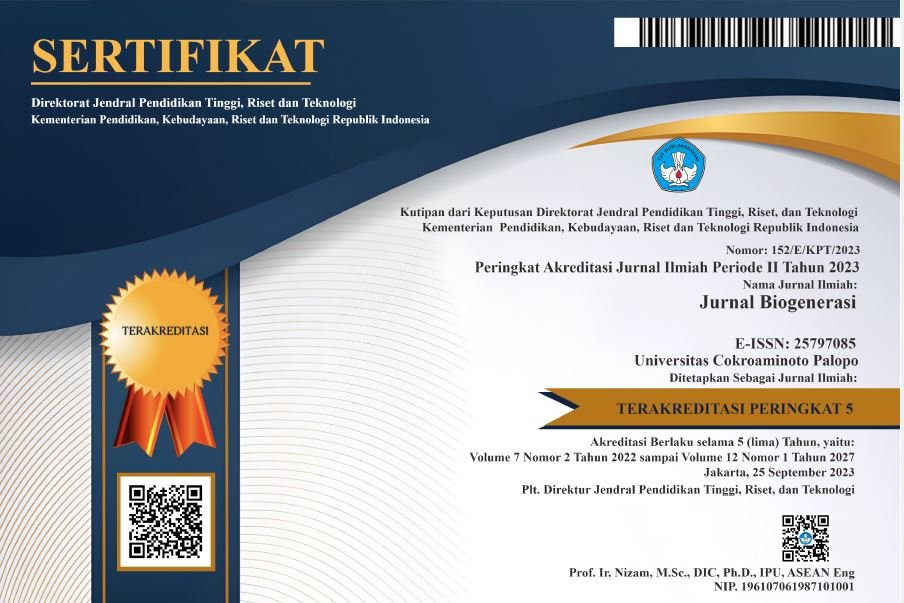FITOREMEDIASI LIMBAH RUMAH TANGGA MENGGUNAKAN TUMBUHAN SEMANGGI AIR (Marsilea crenata)
DOI:
https://doi.org/10.30605/biogenerasi.v9i2.4757Keywords:
Phytoremediation, Marsilea crenata, TDS, pH, temperature, household effluentAbstract
Phytoremediation is an environmentally friendly technique that utilizes the ability of plants to absorb and break down pollutants. This study aims to evaluate the effectiveness of phytoremediation of (Marsilea crenata) plants in reducing pollutants in household waste. Experiments were conducted with variations in wastewater concentrations of 500 ml, 700 ml, 1000 ml, and 1200 ml, and control. The parameters observed included Total Dissolved Solids (TDS), pH, and temperature, which were measured on days 0, 2, 4, and 6. The results showed that treatment with Water Clover effectively reduced TDS, pH, and temperature levels of wastewater. At a concentration of 500 ml, TDS dropped by 79 ppm in 6 days. pH at 700 ml treatment dropped by 1.66 while temperature at 700 ml treatment dropped from 30.2°C to 26.8°C. The decrease in the value of these parameters shows that Marsilea crenata has great potential in improving the quality of household wastewater.
Downloads
References
Hasibuan, R. (2016). Analisis dampak limbah/sampah rumah tangga terhadap pencemaran lingkungan hidup. Jurnal Ilmiah Advokasi, 4(1), 42-52.
Kustiyaningsih, E., & Irawanto, R. (2020). Pengukuran total dissolved solid (tds) dalam fitoremediasi deterjen dengan tumbuhan Sagittaria lancifolia. Jurnal Tanah dan Sumberdaya Lahan, 7(1), 143-148.
Musapana, S., Dewi Endah, R. S., & Rahayu, R. C. (2020). Efektivitas semanggi air (marsilea crenata) terhadap kadar tss pada fitoremediasi limbah cair tahu. Florea: Jurnal Biologi dan Pembelajarannya, 7(2), 92-97.
Nadhifah, I. I., Fajarwati, P., & Sulistiyowati, E. (2019). Fitoremediasi dengan Wetland System Menggunakan Eceng Gondok (Eichhornia crassipes), Genjer (Limnocharis flava), dan Semanggi (Marsilea crenata) untuk Mengolah Air Limbah Domestik. Al-Kauniyah: Jurnal Biologi, 12 (1), 38–45.
Nono, K. M., Amalo, D., & Bakok, A. (2020).Pengaruh tumbuhan talas(Colocasia esculenta (L.) Schott var. aquatilis Hassk) sebagai fitoremediasi terhadap kualitas air limbah laundry. Jurnal Biotropikal Sains, 17(2), 37-47.
Raissa, D. G., Tangahu, B.V. 2017. Fitoremediasi Air yang Tercemar Limbah Laundry dengan Menggunakan Kayu apu (Pistia stratiotes). Jurnal Teknik ITS, 6(2):232-236.
Rulitasari, D., & Rachmadiarti, F. (2020). Semanggi air (marsilea crenata) sebagai agen fitoremediasi las detergen. LenteraBio: Berkala Ilmiah Biologi, 9(2), 99-104.
Utami, A. P., Pane, N. N. A., & Hasibuan, A. (2023). Analisis dampak limbah/sampah rumah tangga terhadap pencemaran lingkungan hidup. Cross-border, 6(2), 1107-1112.
Widowati, H., Susanto, A., & Widya, W. D. (2018). Fitoteknologi dan Efek Fitoremediasi. Banten : LPPM UMMetro Press
Downloads
Published
How to Cite
Issue
Section
License
In submitting the manuscript to the journal, the authors certify that:
- They are authorized by their co-authors to enter into these arrangements.
- The work described has not been formally published before, except in the form of an abstract or as part of a published lecture, review, thesis, or overlay journal.
- That it is not under consideration for publication elsewhere,
- That its publication has been approved by all the author(s) and by the responsible authorities – tacitly or explicitly – of the institutes where the work has been carried out.
- They secure the right to reproduce any material that has already been published or copyrighted elsewhere.
- They agree to the following license and copyright agreement.
License and Copyright Agreement
Authors who publish with this journal agree to the following terms:
- Authors retain copyright and grant the journal right of first publication with the work simultaneously licensed under Creative Commons Attribution License (CC BY 4.0) that allows others to share the work with an acknowledgment of the work's authorship and initial publication in this journal.
- Authors are able to enter into separate, additional contractual arrangements for the non-exclusive distribution of the journal's published version of the work (e.g., post it to an institutional repository or publish it in a book), with an acknowledgment of its initial publication in this journal.
- Authors are permitted and encouraged to post their work online (e.g., in institutional repositories or on their website) prior to and during the submission process, as it can lead to productive exchanges, as well as earlier and greater citation of published work.


.png)

